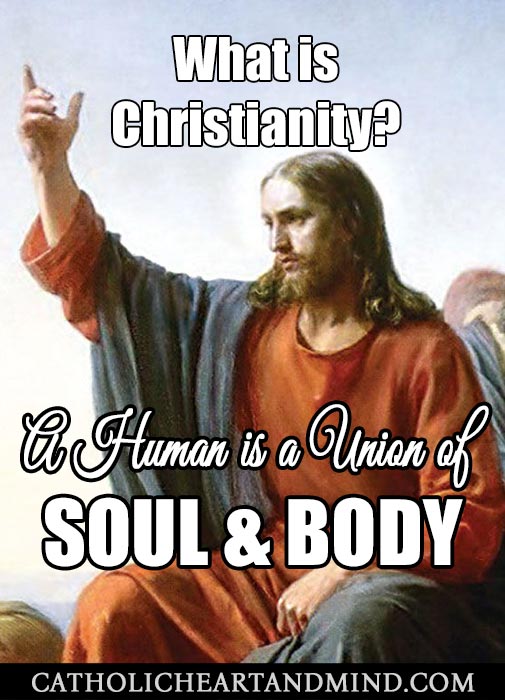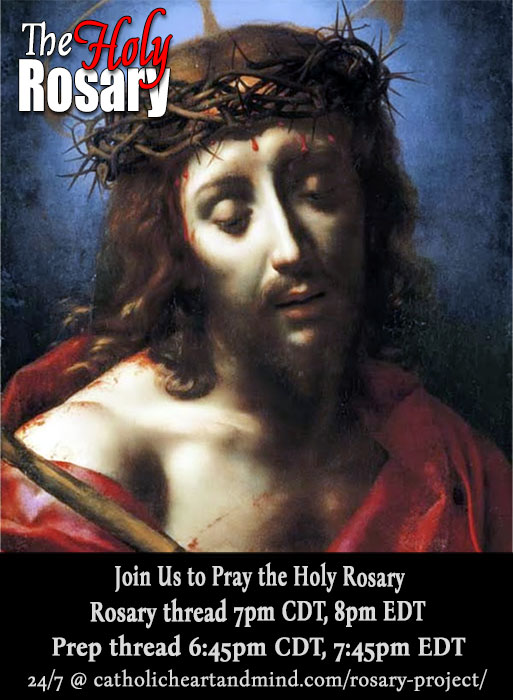+JMJ+ (We’re continuing our series What is Christianity? or Catholicism 101.) How many times have you heard someone say it? “I am a soul, I have a body.” That’s not what the Church teaches. Think it doesn’t matter? Oh, but it does. If you think you are a soul who has a body, then you probably think your soul is the more important of the two and that the body is somehow second rate. There is a sense in which this is true. After all, the soul can live without the body, but the body can’t live without the soul. But without the body you would be incomplete. A human person consists of a soul and a body. A better way of saying that would be, a human person is a union of body and soul. *I like to say the words together, well, as close together as I can say them, bodysoul or soulbody. I just can’t seem to say them at the same time. We humans are limited that way, one thing after another, one thing at a time.)
Still not convinced it matters? Let me tell you about some things I’ve heard people say and not just once or twice but many times. Seems the further away people drift (or run) from Christianity, the further into the darkness their minds descend. Take, for example, some of the arguments people make in support of abortion.
“What I did freed that child [if this person will even admit that it was a child] so he could go directly to heaven and not be trapped here to live in this world with all of its problems.” Usually they mean they’ve done what they’ve done so that the child wouldn’t have to suffer living in poverty or with some illness. As if they know, with their God-like powers of foreknowledge, what the future of the child would be and what conditions he’d have to live in, and as if none of those conditions might be temporary.
Another way this misunderstanding of the body-soul union manifests is in the notion that we are free to do whatever we want with our own body because only the soul really matters. Someone who thinks like this may do all kinds of exercises and buy all kinds of products to care for the body, but at the same time commit acts that I can only describe as degenerate or downright evil. I hate to break it to that person but his body and soul are both in danger.
Then there’s the person who commits truly atrocious acts but says, “I don’t think I’ve done anything wrong. My conscience doesn’t bother me.” Maybe he did follow his conscience and maybe it doesn’t bother him. But maybe he’s following his fallen conscience and has never bothered to calibrate it. If he’s been baptized, that’s a good first step, but it isn’t enough. He needs to deal with concupiscence, the tendency we have to sin, that way we’re drawn away from the right thing to do and toward the wrong thing to do, the sinful thing to do.
That’s something we all have to deal with and it takes grace, which we ordinarily receive in the sacraments, and disciplined effort in practicing the virtues. I heard someone say once (I think it was in a talk by Tim Staples but I don’t remember which one), “Practice virtue, become virtuous. Practice vice, become vicious.” Those words stuck with me and I’ve quoted them many times since I first heard them. They help me make sense of what I see around me and in me, too. I have my own battles to fight. We all do. We all have to calibrate our conscience before we can follow it. We have to be vigilant that we don’t stray onto a path that will lead us in a direction away from the light and life and into darkness and death.
A good way to learn more about this (and to put what you learn into practice) is to use a guide to the interior life. If you don’t have a spiritual director, then a good book will do. (Some of the saints had to rely on books until they were able to find directors themselves.) Brant Pitre’s Introduction the the Spiritual Life: Walking the Path of Prayer with Jesus would be a good book to help you get started. (Link to the book in the notes below.)
Video, Dr. Brant Pitre Shares the HEART of the Spiritual Life – A Catholic Discussion with Tim Gray.
Studying and praying the New Testament would be a great way to proceed, too. Spend time with the Sermon on the Mount, especially with the Beatitudes, rules for living as a disciple of Christ, given by the Lord Himself. (Links to some articles below.) I’ve got this book in my Verbum library, St. Gregory of Nyssa: The Lord’s Prayer, The Beatitudes. I don’t know if I bought it or if it got in there when they updated/upgraded Verbum. That does happen. (Links below.)
That’s it for this week. Thank you for visiting and reading. Feel free to comment or leave feedback. May this Lenten season bring us to knowledge of and love for the Cross of our Lord, and may we pick up our own and follow Him with ever more love and faithfulness. God bless you, every one, and may His peace be always with you. +JMJ+
Join me on Fridays for the Rosary Project Live on Twitter at 8pm ET, 7pm CT, to cultivate a culture of Light, Life, Love, Truth, Beauty, and Goodness, for the conversion of sinners, and for the salvation of souls. There’s also a Rosary on the blog you can use anytime.
“The Rosary is the ‘weapon’ for these times.” — Padre Pio
Notes and Links
- Dr. Brant Pitre Shares the HEART of the Spiritual Life – A Catholic Discussion with Tim Gray.
- Introduction the the Spiritual Life: Walking the Path of Prayer with Jesus, by Brant Pitre: Hardcover, Kindle (Amazon affiliate links, see Full Disclosure below).
- I did a series on his book, too. “Quest for Holiness or I wanna be a SAINT: Introduction to the Spiritual Life.” You’ll find the links on the Book of the Month page. Scroll down to the end of the list.
- The most astonishing item in the Sermon on the Mount, by Jeff Mirus.
- The Blessed Path, by Scott Hahn.
- St. Gregory of Nyssa: The Lord’s Prayer, The Beatitudes, Verbum/Logos format, Hardcover. Free PDF in the Ancient Christian Writers Collection at the Internet Archive. Gregorius Nyssenus – De oratione Dominica. De beatitudinibus EN (Hilda C. Graef, 1954) ACW 018.pdf. (There are 51 different volumes available as free downloads in that series, I think.)
- Much more about the soul may be found in the Weekly Series on the Soul and the Series On the Soul, Vol. 2.
Image: In the banner, Sermon on the Mount, by Carl Bloch, via Wikimedia Commons, public domain.
Subscribe via email: While you’re here, subscribe to get new blog posts, updates on projects like the ebooks, giveaways, and who knows what else. And thank you very much!
Full disclosure: When you make any purchase through my Amazon affiliate links (or my general Amazon link) on this site, I may make a small commission at no cost to you. Thank you. And thank you for your prayers and support.
Copyright: All original material on Catholic Heart and Mind is Copyright © 2009-2024 Lee Lancaster. All rights reserved. Read more.
Series Navigation
Annotated Table of Contents Catholic Christianity 101 Series
Annotated Table of Contents for all series.


